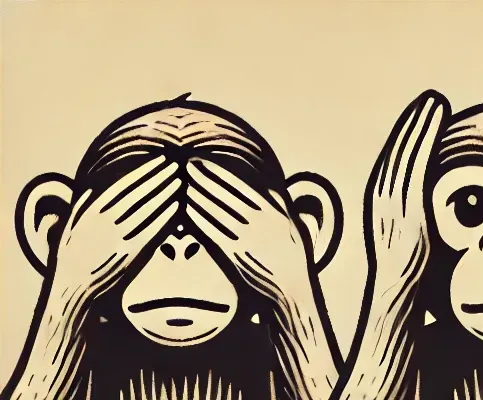What is the meaning of the phrase ‘hear no evil, see no evil, speak no evil’?
There are two meanings to this proverb. One is ‘ignoring bad behaviour or wrongdoing’ and the other is an instruction to avoid dwelling on or engaging with negative or harmful thoughts and actions.
What is the origin of the phrase ‘hear no evil, see no evil, speak no evil’?
The phrase ‘hear no evil, see no evil, speak no evil’ is derived from Buddhist teachings of the three wise monkeys, possibly dating back to at least the first century BC. These three monkeys are a visual maxim, symbolising the Buddhist principle “see no evil, hear no evil, speak no evil”. The three monkeys are:
Mizaru, who covers his eyes and “sees no evil.”
Kikazaru, who covers his ears and “hears no evil.”
Iwazaru, who covers his mouth and “speaks no evil.”
The Buddhist teachings said that if we do not hear, see or speak evil, we ourselves shall be spared from evil. A 17th century carving over a door of a stable of the Tōshō-gū shrine in Nikkō, Japan popularised his visual maxim. Now, the three wise monkeys are frequently depicted in sculptures, paintings, and other forms of art across cultures.
When the phrase ‘‘hear no evil, see no evil, speak no evil’ came over to the West, the meaning of the phrase changed considerably. In the West, the phrase is used to express the deliberate ignoring of bad behaviour or wrongdoing. When the phrase is used in this context it has the same meaning as the phrase ‘turn a blind eye’.
What are some notable uses of the phrase ‘hear no evil, see no evil, speak no evil’?
In 1989, there was a classic American thriller comedy film released called ‘Hear no evil, speak no evil’, alluding to the phrase ‘hear no evil, see no evil, speak no evil’. The film was a big hit and starred Gene Wilder and Richard Pryor, playing a deaf man and a blind man who witnessed a murder. The omission of ‘speak no evil’ from the film title adds to the comedic nature of the film, since it features a great deal of swear words and curse words.

